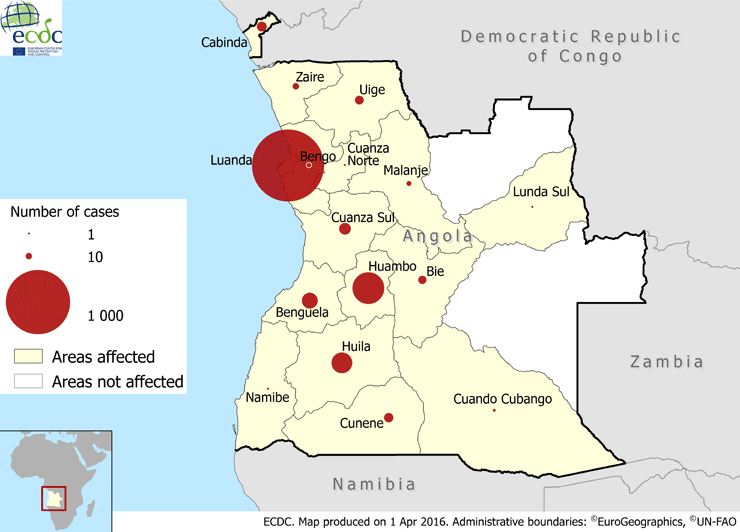Epidemiological update: outbreak of yellow fever in Angola, 31 March 2016
There is an ongoing outbreak of yellow fever in Angola that started in December 2015 in the municipality of Viana, Luanda province and spread to other provinces of Angola in the past weeks.
There is an ongoing outbreak of yellow fever in Angola that started in December 2015 in the municipality of Viana, Luanda province and spread to other provinces of Angola in the past weeks.
As of 30 March 2016, the Ministry of Health in Angola has reported 1 794 cases, including 198 deaths. Of these cases, 483 are laboratory-confirmed. According to WHO, 17 laboratory-confirmed locally-acquired cases have been detected in 10 districts of six provinces outside Luanda. As of 30 March, 16 of 18 provinces across the country have reported suspected cases (Figure 1). Transmission continues in Luanda that remains the most affected province with 906 cases, of which 344 confirmed, including 141 deaths. The number of cases from provinces other than Luanda is reported to be increasing.
Figure 1. Distribution of yellow fever cases in Angola, 5 December 2015 - 27 March 2016

Yellow fever is an acute viral haemorrhagic disease caused by a flavivirus transmitted to humans through the bites of infected Aedes mosquitoes. The disease is considered endemic in Angola. However, this is the first outbreak reported in Angola since 1988. Vaccination is the main preventive measure giving permanent effective immunity within 30 days for 99% of vaccinated persons. Outbreak response activities are on-going, including a mass vaccination campaign in January 2016 and aiming at immunising 6.7 million people in Luanda province initiated as well as vector control activities. According to WHO, as of 14 March 2016, administrative data indicate a vaccination coverage of 80% for the province of Luanda.
As of 29 March, imported cases of yellow fever have been reported in China (6), Kenya (2), the Democratic Republic of Congo (10) and Mauritania (1). In addition, yellow fever cases have been reported among expatriates residing in Angola, including nationals of Eritrea, Democratic Republic of Congo, Cape Verde, Lebanon and India. According to Chinese media, the People’s Republic of China Embassy in Angola has issued an alert regarding the need for vaccination against yellow fever, stating that at least six Chinese citizens have died of yellow fever in Angola in 2016.
WHO estimates that 508 million people are living in 31 African countries at risk for transmission of yellow fever. Therefore, the large outbreak of yellow fever in Angola is of concern with regards to the risk of introduction of the virus through viraemic travellers to countries at risk of transmission, especially in neighbouring countries.
ECDC published a rapid risk assessment on 25 March 2016. The competent vector for yellow fever, the Aedes aegypti mosquito, is not present in continental Europe but is present in the island of Madeira, an autonomous region of Portugal where the weather conditions are not currently suitable for high mosquito activity.
Proof of vaccination is required for all travellers aged 1 year and above entering Angola. The WHO recommends vaccination for all travellers older than 9 months of age in areas where there is evidence of persistent or periodic yellow fever virus transmission. European citizens travelling to or residing in Angola should be vaccinated against yellow fever as per their national health authorities’ recommendations. Vaccine should be administered at least 10 days before travelling.
Yellow fever in an urban setting is considered a public health emergency that may result in a large number of cases. Vaccination is the single most important and effective measure for preventing yellow fever. Therefore, additional cases in unvaccinated populations related to this urban outbreak should be expected, until a sufficient proportion of the susceptible population is immunised. The outbreak in Angola is not yet controlled and is currently expanding to additional provinces challenging the ongoing mass vaccination campaign. The control of the outbreak in Angola is needed in order to prevent further spread in the region and beyond.





